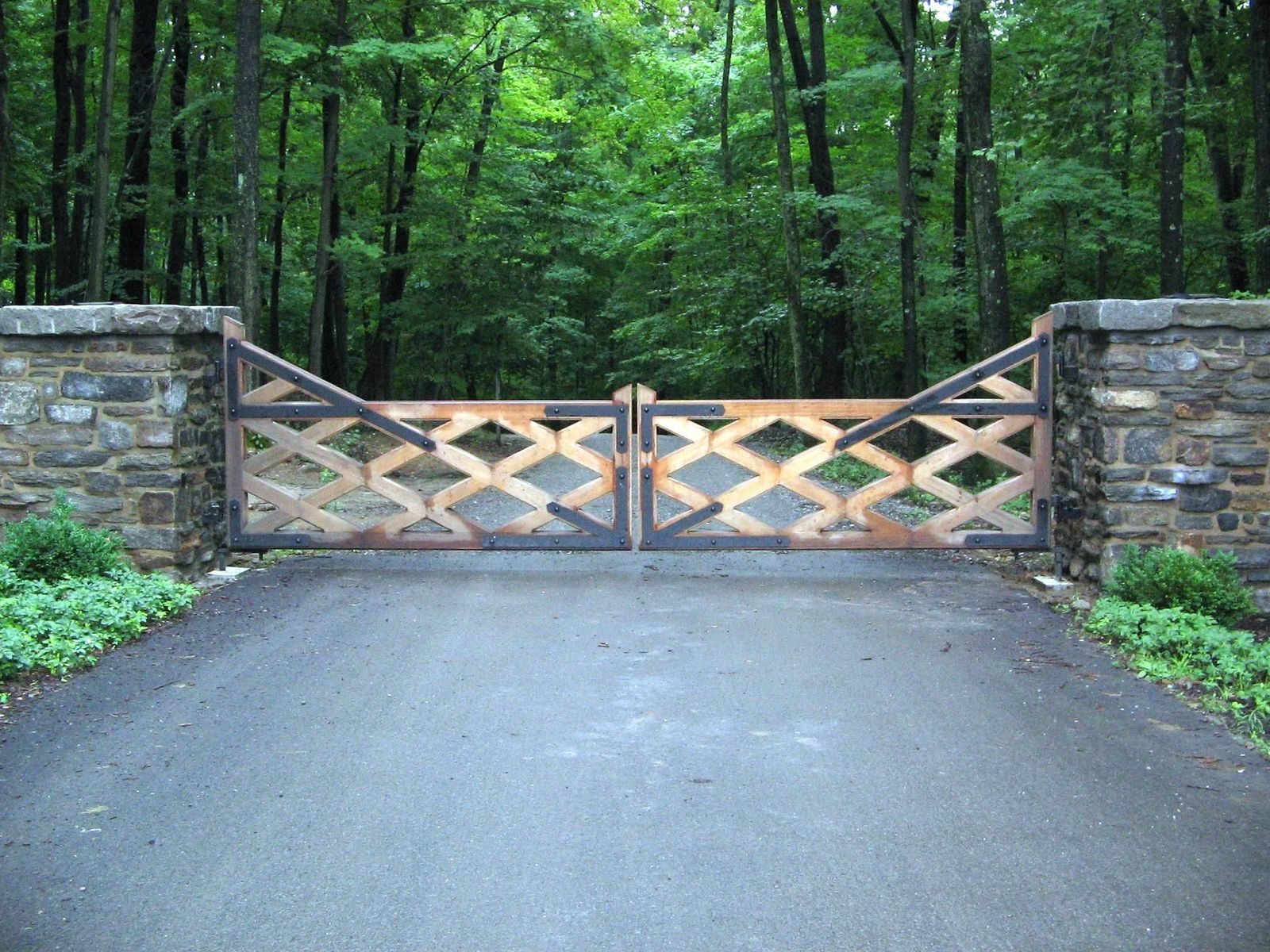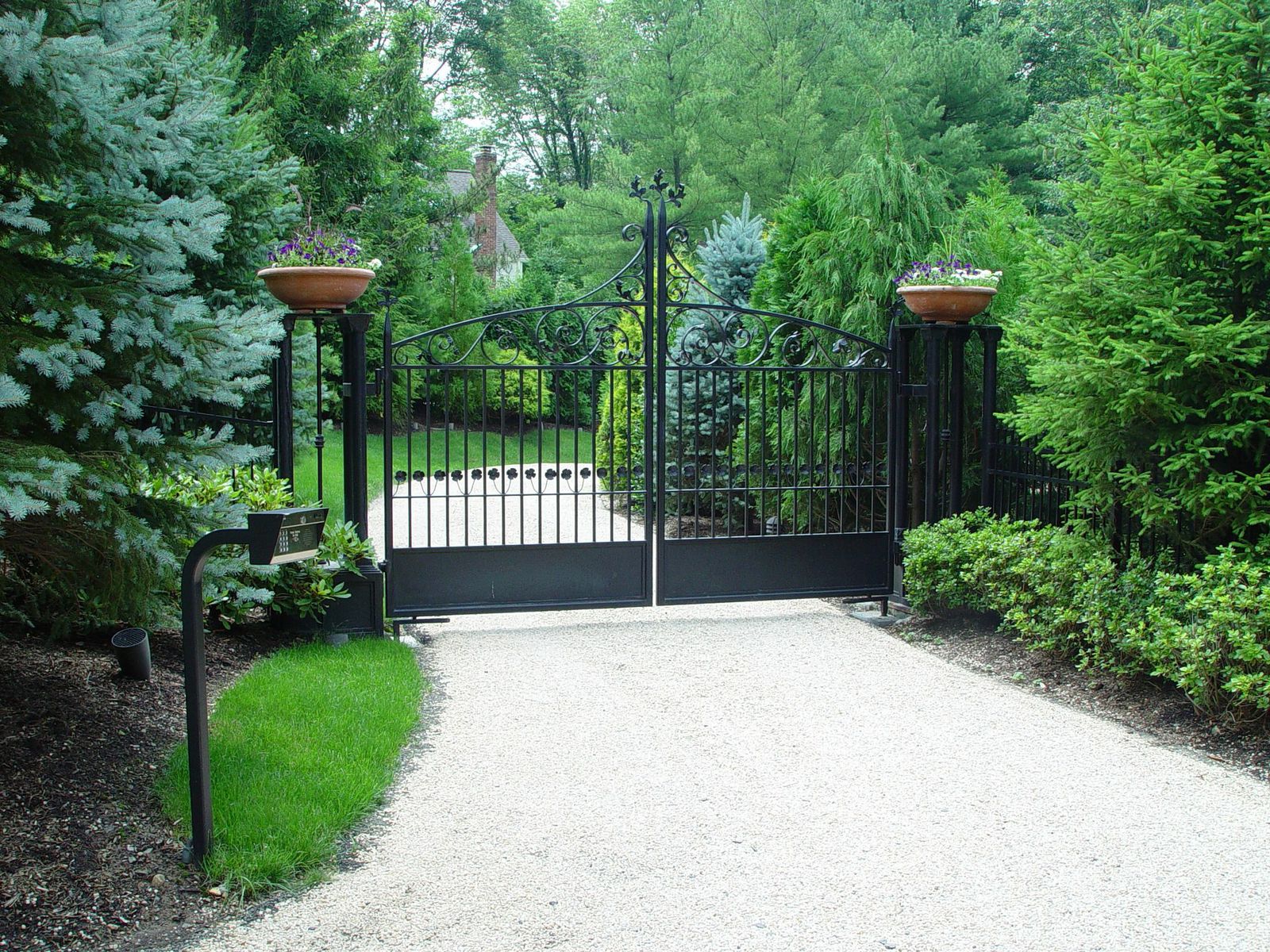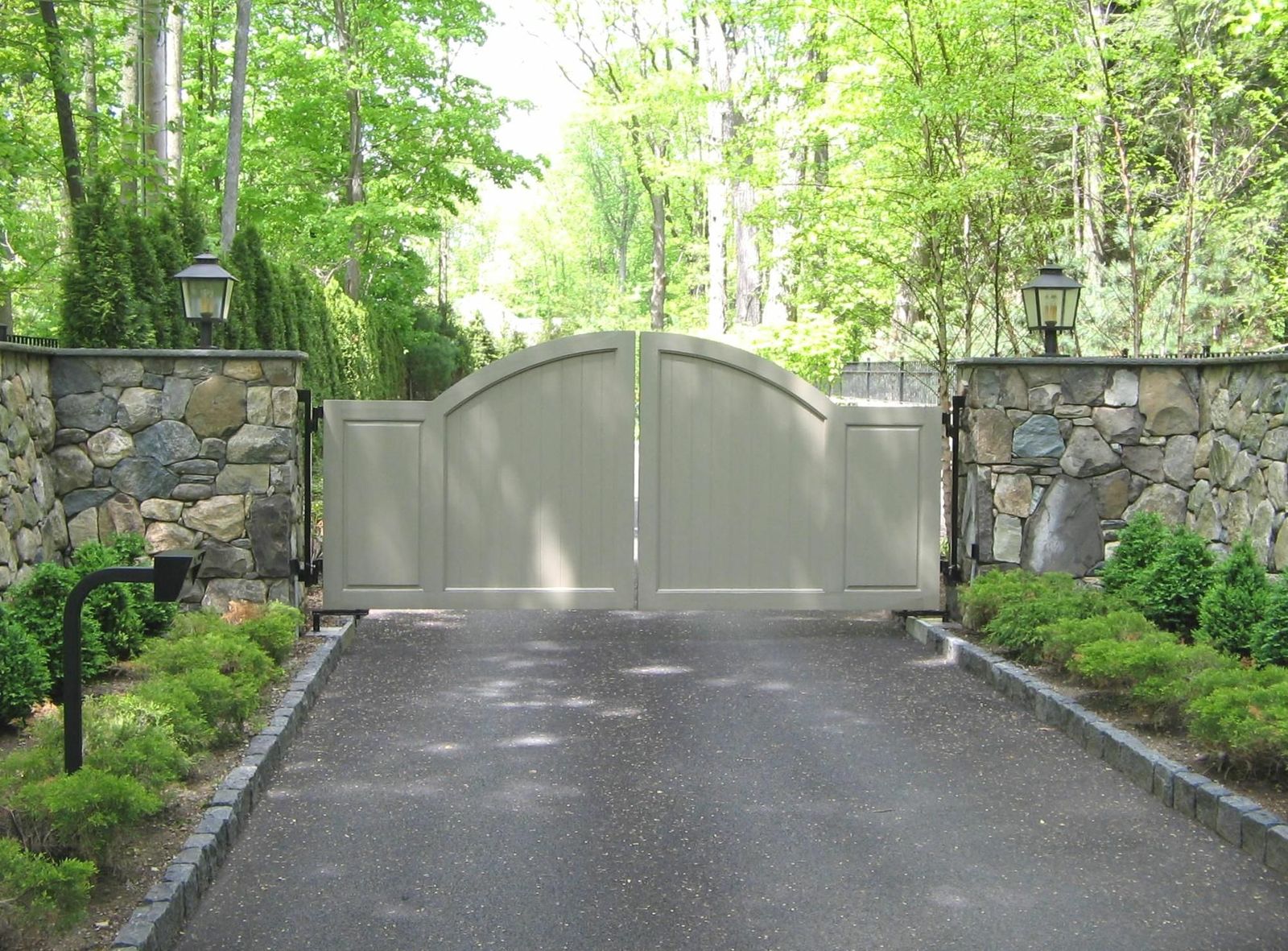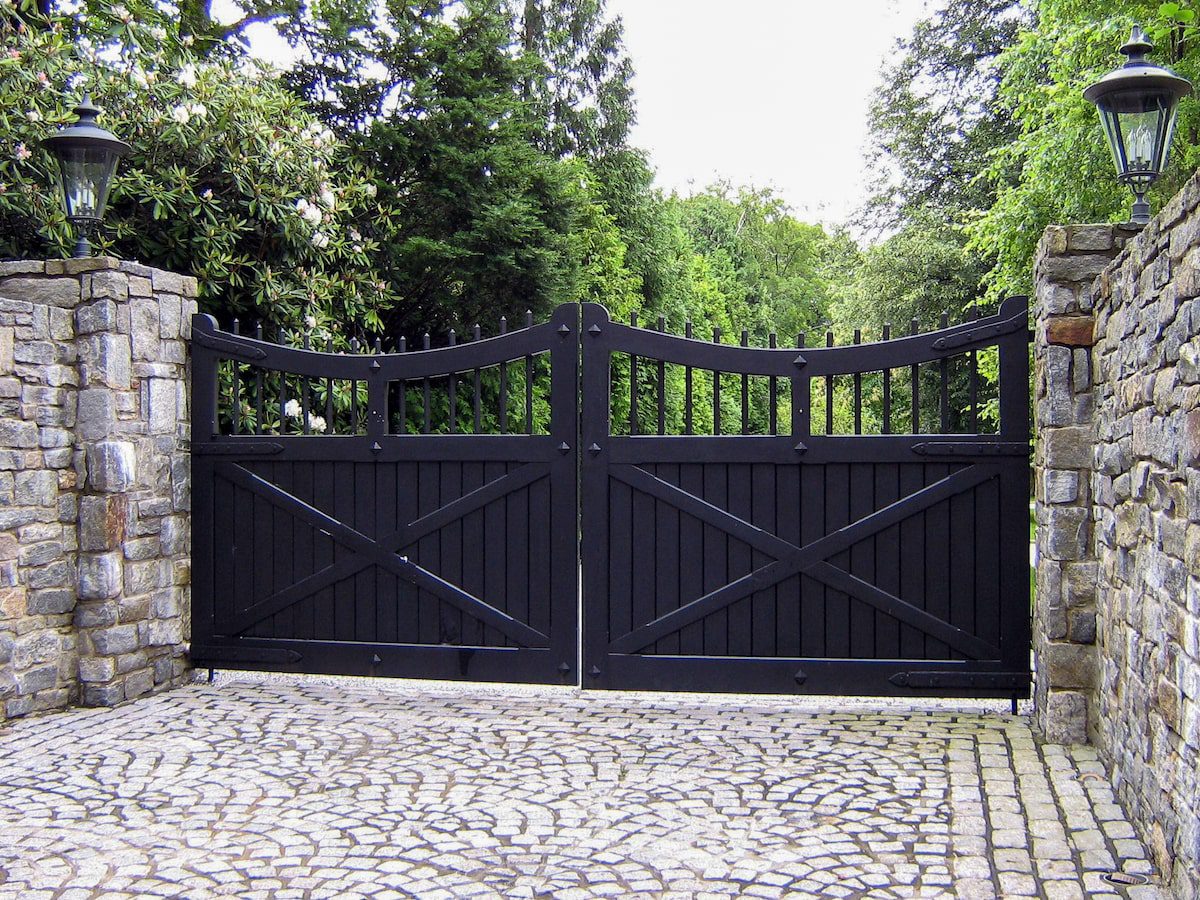You are using an outdated browser. Please upgrade your browser to improve your experience.
When it comes to choosing the best material for a residential driveway gate – be it wood, metal, or composite – there are several key elements to consider. This post will help you evaluate the best material for your driveway gate based on these four factors:
- Primary Function – What’s your gate for? Do you want a gate mostly for its aesthetic appeal, for privacy, or for security?
- Maintenance Frequency – What kind of maintenance schedule would you prefer?
- Design Options – What options are available in this medium? Do you want a gate in a familiar style you’ve seen before, or are you looking for something completely new and customized?
- Cost – What’s your price range for your new gate, and how will maintenance costs down the road factor into your decision?
Wooden, metal (which includes wrought iron, bronze, stainless steel, and aluminum), and composite driveway gates have unique features that will help determine your decision on which material is the best for your entrance gate.
Wooden Driveway Gates

Wooden driveway gate designs run the gamut from simple post-and-rail ranch styles to solid-front designs that offer maximum privacy. We start with a heavy-duty steel core, which is then wrapped in either select grade clear western red cedar, mahogany, or Brazilian ipe – all woods that are both beautiful to look at and naturally resistant to decay. In fact, ipe is so hard and dense that it has an A1 rating for fire resistance – the same as concrete!
Primary Functions: Privacy, Security
Wooden driveway gates are best suited for homeowners wanting more privacy than an iron gate can offer. They’re also the preferred choice for farm properties needing to keep out wildlife and/or secure ranch animals and equipment.
Maintenance Frequency: Medium
Wood must be re-stained or painted every 5-7 years, but cedar, ipe, and mahogany are all naturally resistant to erosion and decay. All automated gates, regardless of material, should be serviced bi-annually (typically in fall and spring).
Design Options: Many Styles, Limited Variation
By nature, wood has fewer design options than wrought iron. Typical styles include modern farmhouse, traditional farmhouse or ranch gates, trellis, and post-and-rail designs. The natural material often has an earthy, rustic charm, but it can also easily work in a more formal design, particularly when paired with well-placed metal accents.
Cost: Higher Overall, But Fewer Cost Variations
Our wooden driveway gates are essentially two gates in one due to their steel core and wood exterior, so they have a higher overall cost. However, the cost is more consistent across different designs because there are fewer twists and turns (literally) to the way they’re designed and executed than there are with metal gates.
Metal Driveway Gates

Metal has been used for centuries for all types of entry gates around the world, and it makes sense why. Metal – and, in particular, the classic choice, wrought iron – is sturdy, resilient and can be worked into patterns as complex as the heart desires. We recommend wrought iron for residential gates for its longevity, strength, and security. You can use it alone or combine it with wood for a totally unique design.
We also work in aluminum, bronze, and stainless steel. Each one brings its own unique set of charms and characteristics to your property. For instance, our stainless steel is hand polished to a gleaming finish that reflects the light, perfectly complementing sleeker, more modern designs. Bronze, however, naturally patinas with age – an effect that we can develop in advance before installation upon request.
Primary Function: Curb Appeal
Iron entrance gates are excellent for displaying the property that lies beyond them. Therefore, residential wrought-iron gates are generally used for style and security rather than for privacy.
Maintenance Frequency: Medium
To prevent rust and repair chipping, iron gates should be repainted every 5-7 years (or as needed). At Tri State Gate, we typically hot dip galvanize our wrought iron, which adds a zinc coating to the metal, protecting it from oxidation. We then prime and paint over it for finishing. All automated gates should be serviced bi-annually (typically in fall and spring).
Design Options: Limitless
Your imagination is the limit when it comes to wrought-iron and other metal driveway gate designs. Wrought iron is forged, heated, and hammered by a trained blacksmith through a time- and craftsmanship-intensive process. Each new round of heating and hammering strengthens the internal structure of the metal as it’s slowly sculpted into a custom design of your choosing. Over the years, we’ve installed everything from ultra-modern iron gates to highly ornate classic styles to completely custom ornamental gates.
Cost: Wide Variation
Iron gates have a greater price variation. A simple iron gate for a residential driveway is surprisingly affordable and pays for itself with a boost in curb appeal. Custom, ornamental, and intricate designs are more costly. Prefabricated cast iron metal components can help keep costs down, but will offer limited design choices and aren’t as strong as wrought iron.
Composite Driveway Gates

Composite materials offer the beauty of wood without the upkeep. Our composite gates start with a heavy-duty steel core wrapped in a lightweight, yet durable, PVC material.
Primary Function: Privacy, Security
Composite gates offer a balance between beauty and privacy with a look that is almost identical to wooden gates.
Maintenance Frequency: Low
The appeal of a composite gate is that it requires almost no upkeep aside from the recommended biannual maintenance and repainting every 5-7 years. The PVC material doesn’t rot, weather, crack, or harbor pests.
Design Options: Similar to Wooden Gates
A composite gate can have almost all of the same designs that are available in a wooden gate. Composite doesn’t have the natural grain and porousness of wood, so it cannot be stained. However, it can be painted in just about any outdoor-weather paint.
Cost: Higher Up-Front, Offset by Lower Maintenance
You’ll pay more for a composite driveway gate, but the upfront cost pays for itself in limited upkeep over the life of the gate.
Get the Finest Driveway Gate Materials with Tri State Gate
Contact us to learn more about what materials would work best for your driveway gate. We’re happy to answer all your questions, and we offer free on-site consultations and estimates.

